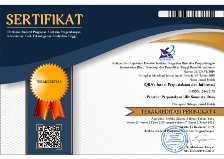Online Research Skills (ORS): Solusi Literasi Mahasiswa Perguruan Tinggi di Masa Pandemi Covid-19
Abstract
Abstrak
Penulisan artikel ini didasari situasi memprihatinkan yang melanda dunia akibat pandemi covid-19 yang menyebakan pemerintah menerapkan berbagai kebijakan diantaranya adalah PPKM Darurat dan PJJ dimana masyarakat harus mengurangi kerumunan atau keramain termasuk dalam hal ini adalah penerapan pembelajaran jarak jauh karena proses pendidikan tidak boleh berhenti. Di sisi lain masih banyak pelajar dan mahasiswa yang masih kurang literat (terampil) dalam memanfaatkan sumber-sumber online yang melimpah guna mendukung proses belajar mandiri. Rumusan masalah dalam penulisan artikel ini adalah bagaimana literasi digital dapat menjadi salah satu solusi bagi pelajar, mahasiswa, guru dan dosen untuk tetap dapat melakukan proses pembelajaran secara mandiri tanpa harus melakukan tatap muka. Tujuan dari penulisan ini adalah untuk memberikan wawasan kepada masyarakat sekolah dan perguruan tinggi mengenai strategi literasi Online Rresearch Skills (ORS) sebagai upaya pembelajaran mandiri secara efektif dan efisien guna menghemat waktu dalam mencari informasi yang benar-benar sesuai dengan topik penelusuran mereka. Selain itu, dengan ORS juga dapat diketahui berbagai laman-laman atau situs-situs gratis yang tersedia di dunia maya yang dapat diakses dari mana dan kapan saja. Hal ini dapat membantu para pelajar, mahasiswa maupun para peneliti dalam menemukan berbagai literatur atau bahan-bahan rujukan yang mereka perlukan (sesuai dengan topik dan bidang mereka). Hal ini terutama sangat bermanfaat dan membantu terutama bagi pelajar, mahasiswa dan bahkan peneliti dimana lembaga tempat mereka belajar dan bekerja namun belum mampu melanggan situs-situs berbayar.
Kata Kunci: Literasi Informasi, Literasi Digital, Online Research Skills
Abstract
The writing of this article is based on the alarming situation that has hit the world due to the covid-19 pandemic which has caused the government to implement various policies including The Limitation of Society Activities in Small Scale (PPKM) and Dostance Learning Education (PJJ) where people have to reduce crowds, including in this case the application of distance learning because the education process should not stop. On the other hand, there are still many students and university students who are still not literate (skilled) in utilizing abundant online resources to support the independent learning process. The formulation of the problem in writing this article is how digital literacy can be a solution for students, university students, teachers and lecturers to keep being able to carry out the learning process independently without having a face to face class. The purpose of this paper is to provide insight to the school and college community regarding the Online Research Skills (ORS) literacy strategy as an effective and efficient independent learning effort in order to save time in finding information that really fits their search topic. In addition, with ORS, we can also find various free homepages or sites available in cyberspace that can be accessed from anywhere and anytime. This can help students, university students and researchers in finding various literature or reference materials they need (according to their topic and field). This is especially very useful and helpful especially for students, university students and even researchers where the institutions in which they study and work have not been able to subscribe the paid sites.
Keywords: Information Literacy, Digital Literacy, Online Research Skills
Full Text:
PDF (Indonesian)References
Daftar Pustaka
Agus Rifai (2014). Penelusuran Literatur. Tanggerang Selatan: Universitas Terbuka.
Aksara. 2009.
Alexandria, Mesir, November 6-9, (2005). Report of a meeting sponsored by the United Nations Education, Scientific, and CXultural organization (UNESCO), National FDorum on Information Literacy (NFIL) and the International Federation of Library Associations and Institutions (IFLA). http://www.infolit.org/I nternational_Colloquium/alexfinalreport.doc. Diunduh 8 Maret 2012
APJII. 2018. Laporan hasil Survei APJII 2018. Infografis Penetrasi dan Perilaku Pengguna Internet di Indonesia Survey 2018. Asosiasi Penyelenggara Jasa Internet Indonesia
Arif Surachman (2013) "Strategi Penelusuran Informasi yang Efektif",>http://mpetipstrikpe
Bawden, D. (2001). "Information and digital literacy: a review of concepts". Journal of Documentation, 57(2)
Behrens, S. (1994). A conceptual analysis and historical review of information literacy. College and Research Libraries, 55,309-322
Davis, Charles H.; Shaw, Debora (eds). (2011). Introduction to information science and technology. Medford,NJ: Information Today html diakses tanggal 25 April 2018 pukul 19.24 WIB.
IFLA ALP (2006). Woorkshop on Information Literacy and IT, Auckland, New ZealandThe basic information literacy skills.
Indonesia. Undang-undang nomor 43 tahun 2007 tentang perpustakaan
Muhammad Kharizmi (2015). "Kesulitan Siswa Sekolah Dasar dalam Meningkatkan Kemampuan Literasi". Jupendas, ISSN 2355-3650, Vol. 2, No. 2, September 2015
Munawaroh dan Melati Purnba Bestari (2017). Modul Literasi Informasi unuk Perguruan Tinggi. Jakarta, Sagung Seto.
Sulistyo-Basuki (2013), "Literasi Informasi dan Literasi Digital", Sulistyo-Basuki's Blog.https://sulistyobasuki.wordpress.com/2013/03/25/literasi-informasi-dan-literasi-digital/
Pawit Yusuf (2009). Ilmu informasi Komunikasi dan Perpustakaan. Jakarta: Bumi
Western Sydney University (2020). What is digital literacy. https://www.westernsydney. edu.¬/ studysmart/ home/study¬skills_guides/ digital_literacy/ dilihat pada 22 Juli 2021.
Zed Mestika (2014). Metode Penelitian Kepustakaan. Jakarta: Yayasan Pustaka Obor Indonesia,
Zulhafizh dan Silvia Permatasari (2020). "Membina Kualitas Belajar di Masa Pandemi Covid-19 Melalui Sikap Berpikir Kreatif dan Kritis". Jurnal PAJAR (Pendidikan dan Pengajaran), Volume 4 Nomor 5 September 2020.
Zulhafizh, dkk. (2013). "Kontribusi Sikap dan Motivasi Belajar Siswa Terhadap Hasil Belajar Bahasa Indonesia". Jurnal Bahasa, Sastra, dan Pembelajaran, Volume 1 Nomor 2, Juni 2013.
DOI: http://dx.doi.org/10.30829/iqra.v16i1.10153
Refbacks
- There are currently no refbacks.
Copyright (c) 2022 Suherman Suherman

This work is licensed under a Creative Commons Attribution-ShareAlike 4.0 International License.
IQRA': JURNAL PERPUSTAKAAN DAN INFORMASI
Perpustakaan Universitas Islam Negeri Sumatera Utara
Jalan Willem Iskandar Pasar V Medan Estate
20371
Medan - Sumatera Utara






